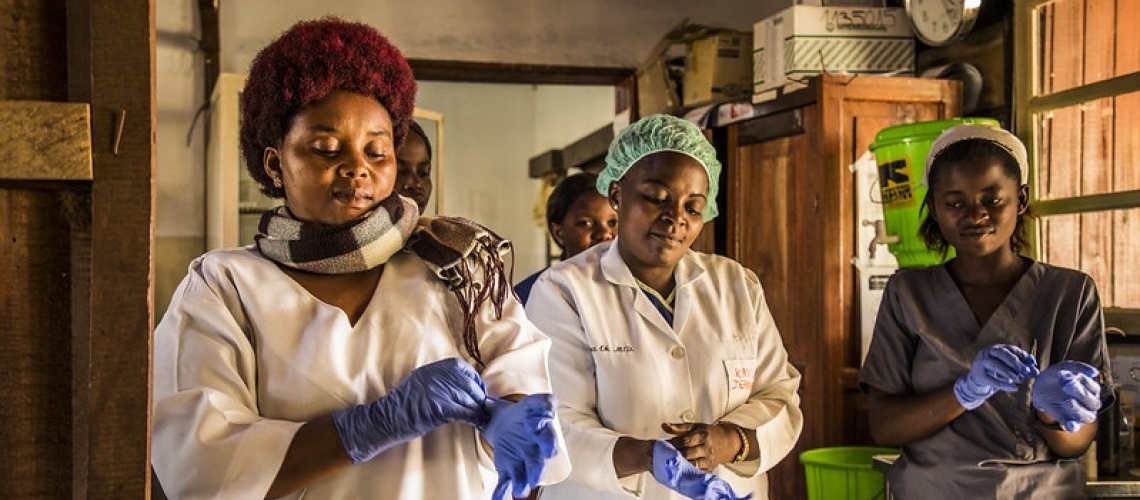How framework agreements are useful for emergency and pandemic response

Health workers put their gloves on before checking patients at the hospital; DRC
The phase that follows an emergency situation is critical when government agencies are under pressure to respond quickly and effectively to people’s needs. This includes procurement and supply of various essential items while ensuring that quick responses do not increase risks beyond what policymakers have defined as acceptable. The newly released Guidebook for Setting-up and Operating Framework Agreements shows that these agreements been proven to be very useful in such situations.
The emergency framework agreement can encompass basic goods and services that are likely to be used in response to a serious emergency. For example, it can include essential drugs and medical supplies, emergency housing, fuel, mattresses, blankets, food and water. Having the framework agreement (FA) will enable procurement units to issue purchase orders against the agreement within minutes of an emergency. The experience of the International Federation of Red Cross and Red Crescent Societies (IFRC) shows that purchasing goods through a FA is more effective in securing the right price, and guaranteeing the quality, quantity and delivery terms.
Here are a few considerations to keep in mind when designing a framework agreement:
- Delivery capacity: In case of an emergency, suppliers could be affected and may be unable to produce and distribute. There could also be production bottlenecks due to lack of raw materials. This is why it is crucial to use a pre-defined checklist to test how resilient each vendor is when faced by a crisis. Having multiple vendors from diverse geographic areas including from other countries can also help reduce the risk.
- Price speculation: During emergencies it is common to see a hike in prices that vendors tend to justify based on an increase in demand and shortages in supply. Even suppliers with FAs might be tempted not to honor contracts subsequently issued and make money by selling at higher prices. In such cases, the government should impose a significant cost to the supplier for not fulfilling the FA. Price ceilings and diversifying vendors could be effective.
Emergency purchases are especially prone to corruption or misuse of public funds and thus it is highly desirable to put in place mitigation measures. One such measure is enabling oversight of procurement processes by taxpayers and civil society through timely disclosure of data and information. For example, during the COVID-19 crisis, Colombia issued an emergency decree about expedited procedures to procure the necessary goods and services. The National Procurement Agency Colombia Compra Eficiente (CCE) asked all companies who can supply these critical products to register for inclusion in FAs. CCE verified information and accepted suppliers in FAs, allowing public agencies from all over the country to procure efficiently, and to compare online prices and characteristics. CCE also mandated disclosure of procurement data in compliance with Open Contracting Data Standard (OCDS), which makes it easier for monitoring. CCE also made a dashboard to identify emergency contracts.
FAs have been extensively used during the pandemic. For example, Government e-Marketplace (GeM) of India has made available about 300 categories of about 300,000 items to respond to COVID-19, which are offered by about 50,000 sellers. As of February 2021, the cumulative order value for the top five items was about US$450 Million.
In the United Kingdom, Crown Commercial Service (CCS) set up a web page to link public sector buyers directly to suppliers with established FAs for items such as PPE, workplace supplies, cleaning and sanitation products. Likewise, UK Universities Purchasing Consortia (UKUPC) website has a guide for purchasing teams which lists “a variety of FAs which provide for return to work products nationally” along with details of which consortium is leading and managing the framework. In addition to this, UKUPC issued a guide to members of the eight higher education purchasing consortiums on what FAs are already in place which could be used for universities to roll out full testing and analysis services for their staff and students.
Even though framework agreements may be very useful for predictable weather-driven emergencies, they are less useful for events which are not really predictable and are ‘once in a generation’ crisis. However, for a prolonged pandemic like COVID-19, new FAs could be quickly set-up and could be effective in meeting urgent procurement needs.
This blog is part of a project supported by the Global Procurement Partnership Multi-Donor Trust Fund (GPP MDTF), a Bank-administered fund investing in public procurement reforms globally and at country levels. The GPP MDTF is implemented with contributions from the Agence Française de Développement, European Commission, Ministry of Foreign Affairs of the Netherlands, and Swiss State Secretariat for Economic Affairs.
